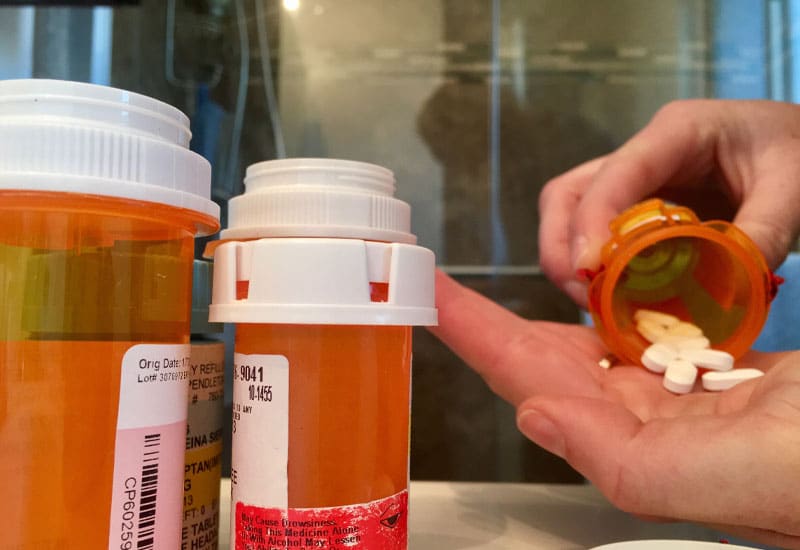Key Points
- Both Concerta and Ritalin contain the active ingredient methylphenidate and are commonly prescribed as part of a comprehensive ADHD treatment plan.
- Methylphenidate is an addictive stimulant classified as a Schedule II controlled substance by the DEA.
- Concerta is the brand name for the long-acting, extended-release formulation of methylphenidate.
- Ritalin is the brand name for the short-acting, immediate-release formulation of methylphenidate.
- Some of the most common side effects of methylphenidate include nausea, mood changes, and irritability.
- More serious side effects of methylphenidate include aggressive behavior, paranoia, and suicidal thoughts.
- There are several known drug interactions linked to methylphenidate, so be sure to tell your doctor about any other medications you’re currently taking.
- Do not drink alcohol while taking Concerta or Ritalin, as doing so can increase the risk of adverse effects.
- Taking methylphenidate, the active ingredient in Concerta and Ritalin, can lead to stimulant use disorder in some people; abusing the drug or mixing it with alcohol can increase this risk.
- Signs of stimulant use disorder include trouble controlling dosage, taking stimulants even though they’re causing problems in your life, and needing more of the stimulant to have the same effect.
- Withdrawal symptoms associated with methylphenidate include anxiety, trouble sleeping, and suicidal thoughts.
- People who misuse stimulants such as methylphenidate are at an increased risk of a life-threatening overdose.
- Signs and symptoms of a methylphenidate overdose include hallucinations, rapid heartbeat, dilated pupils, and clammy skin.
Is Concerta the Same as Ritalin?
Concerta and Ritalin are essentially the same drug. The main difference is that Concerta is an extended-release formulation of the drug, while Ritalin is an immediate-release formulation of methylphenidate. Both are central nervous system stimulants available only by prescription. Methylphenidate is commonly used to treat symptoms of ADHD (Attention Deficit/Hyperactivity Disorder) in adults and children, such as hyperactivity and impulsivity.
As stimulant medications, Concerta and Ritalin are both addictive substances and should be used with caution. Risks include the development of a severe stimulant use disorder as well as a life-threatening overdose. Be sure to tell your doctor at the first signs of addiction to methylphenidate. Before prescribing Concerta or Ritalin for ADHD, your doctor should also be aware of any current or past substance use issues.
What Is Methylphenidate?
Methylphenidate is the active ingredient in both Concerta and Ritalin. It is part of a class of drugs known as central nervous system stimulants. Methylphenidate is FDA-approved for the treatment of attention-deficit hyperactivity disorder, or ADHD for short. The stimulant medications Concerta and Ritalin both work by addressing the symptoms of hyperactivity and impulsivity caused by attention-deficit hyperactivity disorder (ADHD).
Methylphenidate carries a high risk of substance abuse and addiction. The U.S. Drug Enforcement Administration has classified it as a Schedule II controlled substance. [1] A doctor or other healthcare professional must write a prescription for this drug in order for it to be used legally.
What Is Concerta?
Concerta is the extended-release version of methylphenidate. [2] Instead of releasing all of the drug at once, an extended-release tablet releases some of the drug in smaller increments throughout the day. Typically, an extended-release version of a medication doesn’t have to be taken as frequently and lasts longer.

What Is Ritalin?
Ritalin is the immediate-release version of the prescription drug methylphenidate. Once you take a dose of Ritalin, the entire dose is released into your system all at once. You may need to take Ritalin several times per day for it to have a continuing effect.
Side Effects of Methylphenidate
Common Side Effects of Methylphenidate
When taking methylphenidate, many people experience side effects such as: [3]
- Spikes in blood pressure
- Mood changes
- Anxiety
- Excessive sweating
- Headache
- Dizziness
- Increased heart rate
- Loss of appetite
- Weight loss
- Dry mouth
- Nausea
- Indigestion
- Stomach pain
- Vomiting
- Irritability
- Restlessness
If any of these side effects become severe or if they persist for more than a few days, contact your doctor.
Serious Side Effects of Methylphenidate
Some people experience more severe side effects when taking methylphenidate, including: [4]
- Chest pain
- Shortness of breath
- Lightheadedness or faintness
- Aggressive or hostile behavior
- Paranoia
- Hallucinations
- Changes in skin color
- Numbness
- Unexplained wounds
- Feeling cold
- Pain
- Persistent or painful erection
If you or a loved one is experiencing severe side effects after taking Concerta or Ritalin, seek medical advice from your healthcare provider right away.
Methylphenidate Drug Interactions
Methylphenidate, the active ingredient in both Ritalin and Concerta, is associated with several potentially harmful drug interactions. Tell your doctor about any other prescription medications, illicit drugs, over-the-counter medications, and supplements you’re taking. People taking the following medications should not take methylphenidate due to known drug interactions: [5]
- Procarbazine
- Linezolid
- Pimozide
- Selegeline
- Rasagiline
- Phenelzine
- Ozanimod
- Methylene Blue
- Tranylcypromine
- Isocarboxazid
- Safinamide
Methylphenidate: Risk of Abuse
The DEA lists methylphenidate alongside other controlled substances such as cocaine, methamphetamine, and MDMA, or ecstasy. This drug can be highly addictive, especially if it’s taken without a prescription or misused. Some of the risk factors for Concerta or Ritalin abuse include: [6]
- Gender assigned at birth: Men are more likely than women to use illicit drugs.
- Mental health conditions: Depression, ADHD, and other mental disorders may increase the risk of substance abuse, including stimulant abuse.
- Alcohol consumption: Alcohol may increase or extend the effects of stimulants, making them even more addictive.
Signs of Stimulant Use Disorder
Abusing illicit or prescription stimulants such as methylphenidate could lead to a serious condition known as stimulant use disorder. If you or a loved one is taking Ritalin or Concerta, it’s important to be aware of the signs of this disorder: [7]
- Intense cravings for stimulants
- Trouble controlling the amount of stimulants taken
- Continuing to use stimulants even though they’re worsening a physical or mental health condition
- Continuing to use stimulants despite them causing problems at home, work, or school
- Missing deadlines or failing to meet responsibilities due to stimulant use
- Spending an excessive amount of time obtaining, using, or recovering from stimulants
- Using stimulants in dangerous situations
- Giving up activities due to stimulant use
- Building tolerance to stimulants (i.e., needing more of them to achieve the same effects)
- Experiencing withdrawal symptoms when not taking stimulants
Stimulant Withdrawal Symptoms
When a person develops a physical dependence on a stimulant such as methylphenidate, they’ll have withdrawal symptoms when they stop taking the drug. Some of the withdrawal symptoms associated with stimulants like Concerta and Ritalin include: [8]
- Trouble concentrating
- Anxiety
- Depression
- Paranoid thoughts
- Tiredness
- Increased appetite
- Trouble sleeping
- Irritability
- Intense cravings
- Suicidal thoughts
If you or a loved one is experiencing thoughts of suicide or self-harm, call or text 988 to reach the 988 Suicide & Crisis Lifeline.
Methylphenidate Overdose
Taking Concerta or Ritalin in higher doses than prescribed or mixing this substance with alcohol or other stimulant drugs can lead to an overdose. Signs and symptoms of a methylphenidate overdose include: [9]
- Fever
- Agitation
- Anxiety
- Dark urine
- Chest pain or chest discomfort
- Blurry vision
- Confusion
- Dilated pupils
- Pounding, irregular, or rapid heartbeat
- Muscle stiffness
- Muscle twitching
- Muscle cramps
- Dizziness, faintness, or lightheadedness
- Trouble speaking
- Loss of consciousness
- Clammy or pale skin
- Shallow breathing
- Seizures
- Auditory or visual hallucinations
- Trembling, shaking, or shivering
- Abnormal fatigue or weakness
- Vomiting
- Weakness on one side of the body
- Overactive reflexes
- Temporary blindness
If a loved one is experiencing the symptoms above after taking stimulants such as methylphenidate, get emergency medical assistance right away. Call 911 or go to the nearest emergency room. This is a life-threatening emergency.
Concerta/Ritalin Addiction Treatment
The stimulant methylphenidate found in both Concerta and Ritalin is highly addictive. People can become addicted to these drugs even when taking them as directed, but this risk is increased when the medications are abused or mixed with alcohol. Fortunately, evidence-based treatments are available for stimulant use disorder. Addiction can be overcome, and you don’t have to face it alone.




